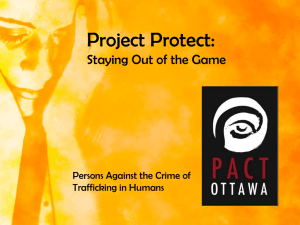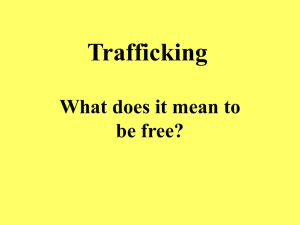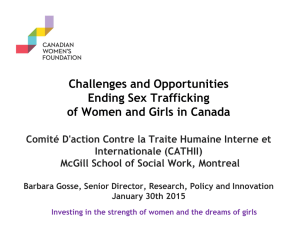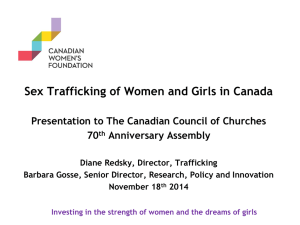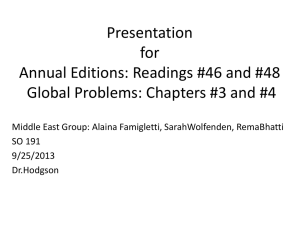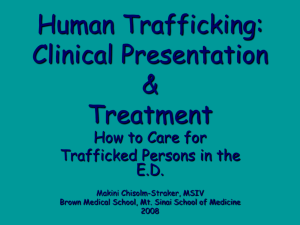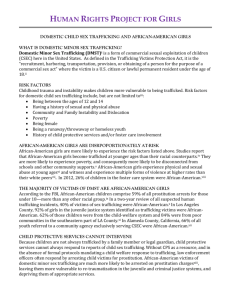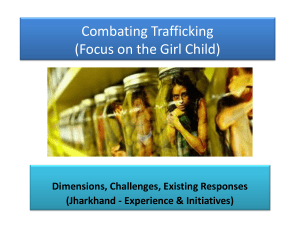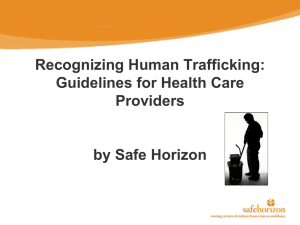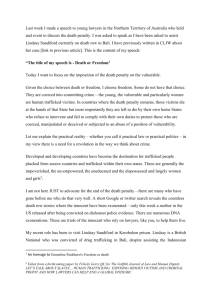GG_report_April_2011
advertisement
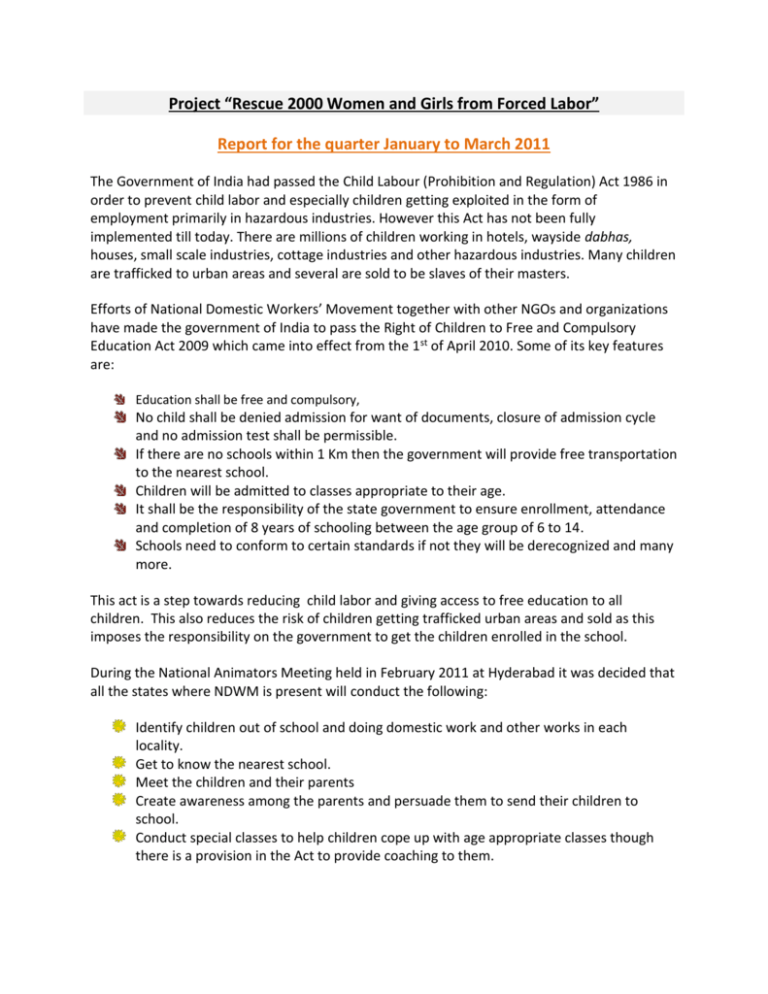
Project “Rescue 2000 Women and Girls from Forced Labor” Report for the quarter January to March 2011 The Government of India had passed the Child Labour (Prohibition and Regulation) Act 1986 in order to prevent child labor and especially children getting exploited in the form of employment primarily in hazardous industries. However this Act has not been fully implemented till today. There are millions of children working in hotels, wayside dabhas, houses, small scale industries, cottage industries and other hazardous industries. Many children are trafficked to urban areas and several are sold to be slaves of their masters. Efforts of National Domestic Workers’ Movement together with other NGOs and organizations have made the government of India to pass the Right of Children to Free and Compulsory Education Act 2009 which came into effect from the 1st of April 2010. Some of its key features are: Education shall be free and compulsory, No child shall be denied admission for want of documents, closure of admission cycle and no admission test shall be permissible. If there are no schools within 1 Km then the government will provide free transportation to the nearest school. Children will be admitted to classes appropriate to their age. It shall be the responsibility of the state government to ensure enrollment, attendance and completion of 8 years of schooling between the age group of 6 to 14. Schools need to conform to certain standards if not they will be derecognized and many more. This act is a step towards reducing child labor and giving access to free education to all children. This also reduces the risk of children getting trafficked urban areas and sold as this imposes the responsibility on the government to get the children enrolled in the school. During the National Animators Meeting held in February 2011 at Hyderabad it was decided that all the states where NDWM is present will conduct the following: Identify children out of school and doing domestic work and other works in each locality. Get to know the nearest school. Meet the children and their parents Create awareness among the parents and persuade them to send their children to school. Conduct special classes to help children cope up with age appropriate classes though there is a provision in the Act to provide coaching to them. Our state units have already begun reporting that they have identified hundred of children (mostly girls) out of school and begun preparing them to start and resume schooling from the next academic year which starts in June 2011. Awareness Campaigns: In the state of Kerala where there is a lot of migration taking place to Gulf countries NDWM together with Migrant Forum conducted several awareness programs which included: Pre departure training, the possible dangers, custody of documents and agreements, the name, address, profession etc. of the employers and several other things. In Tamil Nadu we have screened the movie Kutti that depicts child labor and struggles children face as child domestic workers in the districts of Villupuram and other districts where there are a lot of migration. After watching this movie several parents went back to the employer of their children and brought the children back to their homes. In the North East where there a lot of trafficking and migration taking place we have a school for child domestic workers where there are around 1500 students. This include child domestic workers, children of domestic workers, children rescued from domestic work and trafficking. In Jharkhand child domestic workers are being trained in street play to create awareness about struggles of child domestic workers. Not only that child domestic workers have also formed a football team which has competed the district football team. Similarly several activities are conducted in other states as well. National Level Convention on Child Rights: National Domestic Workers Movement organized a three days National Convention on Child Rights in Chennai from 27th to 29th December 2010, supported by Anti Slavery International. The Convention included two days of workshop on Right to Participation and Education and the third day a Press Conference and Public Meet. About 125 children from eleven states - Tamil Nadu, Karnataka, A.P, Maharashtra, Meghalaya, Bihar, U.P, Orissa, Nagaland, Jharkhand and Manipur participated in the event. The Convention highlighted the following: Do not employ children below 14 years, free and compulsory education should be provided to all children. Children employed above 15 years should be provided special protection. Children should be safeguarded from abuse – sexual, physical and emotional. There should be a safe and sound environment in the working place with weekly off. Children should be treated with respect and dignity. Limit their working hours to enable them to go to school on time. Often they are asked to work for 12 to 15 hours in a day. The child domestic workers themselves addressed the media during the press conference on the third day. They shared their true stories and what forced them to domestic work even in their very early years. Due to poverty, sickness, death of parents, alcoholic father etc children were pushed to work. While some of them were trafficked and sold by the agents, others were ill-treated and abused by the employers. The Movement has been instrumental in rescuing and rehabilitating them and making a difference in their lives through education. Village Vigilance Committees: In order to curb trafficking of young girls and women we have created village vigilance committees in several traffic prone areas. These committees conduct several awareness programs on the ill effects of trafficking. These committees have also identified illegal agencies indulging in trafficking. They have reported quite a few such agencies. They serve a check point to young girls getting trafficked. Conclusion: We regularly intervene in all cases of trafficking and migration where women and young girls are subjected to abuse of all sorts. Our work of empowering domestic workers be it women, young girls or children is on the go. These people are voiceless and powerless with your regular support we are able to stand by them to get their rights. This is an ongoing struggle which we need to fight for the cause of domestic workers and you are our partners in the struggle. We together make things happen. Thank you. Report by J. Prabhu For Sr.Jeanne Devos

